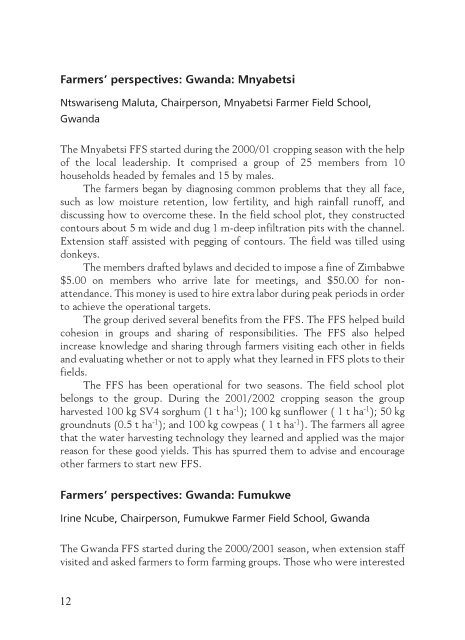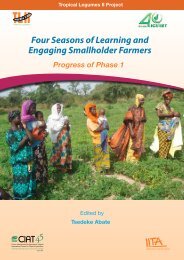Integrated Soil Water and Nutrient Management and Dry ... - Icrisat
Integrated Soil Water and Nutrient Management and Dry ... - Icrisat
Integrated Soil Water and Nutrient Management and Dry ... - Icrisat
You also want an ePaper? Increase the reach of your titles
YUMPU automatically turns print PDFs into web optimized ePapers that Google loves.
Farmers’ perspectives: Gw<strong>and</strong>a: Mnyabetsi<br />
Ntswariseng Maluta, Chairperson, Mnyabetsi Farmer Field School,<br />
Gw<strong>and</strong>a<br />
The Mnyabetsi FFS started during the 2000/01 cropping season with the help<br />
of the local leadership. It comprised a group of 25 members from 10<br />
households headed by females <strong>and</strong> 15 by males.<br />
The farmers began by diagnosing common problems that they all face,<br />
such as low moisture retention, low fertility, <strong>and</strong> high rainfall runoff, <strong>and</strong><br />
discussing how to overcome these. In the field school plot, they constructed<br />
contours about 5 m wide <strong>and</strong> dug 1 m-deep infiltration pits with the channel.<br />
Extension staff assisted with pegging of contours. The field was tilled using<br />
donkeys.<br />
The members drafted bylaws <strong>and</strong> decided to impose a fine of Zimbabwe<br />
$5.00 on members who arrive late for meetings, <strong>and</strong> $50.00 for nonattendance.<br />
This money is used to hire extra labor during peak periods in order<br />
to achieve the operational targets.<br />
The group derived several benefits from the FFS. The FFS helped build<br />
cohesion in groups <strong>and</strong> sharing of responsibilities. The FFS also helped<br />
increase knowledge <strong>and</strong> sharing through farmers visiting each other in fields<br />
<strong>and</strong> evaluating whether or not to apply what they learned in FFS plots to their<br />
fields.<br />
The FFS has been operational for two seasons. The field school plot<br />
belongs to the group. During the 2001/2002 cropping season the group<br />
harvested 100 kg SV4 sorghum (1 t ha -1 ); 100 kg sunflower ( 1 t ha -1 ); 50 kg<br />
groundnuts (0.5 t ha -1 ); <strong>and</strong> 100 kg cowpeas ( 1 t ha -1 ). The farmers all agree<br />
that the water harvesting technology they learned <strong>and</strong> applied was the major<br />
reason for these good yields. This has spurred them to advise <strong>and</strong> encourage<br />
other farmers to start new FFS.<br />
Farmers’ perspectives: Gw<strong>and</strong>a: Fumukwe<br />
Irine Ncube, Chairperson, Fumukwe Farmer Field School, Gw<strong>and</strong>a<br />
The Gw<strong>and</strong>a FFS started during the 2000/2001 season, when extension staff<br />
visited <strong>and</strong> asked farmers to form farming groups. Those who were interested<br />
12

















